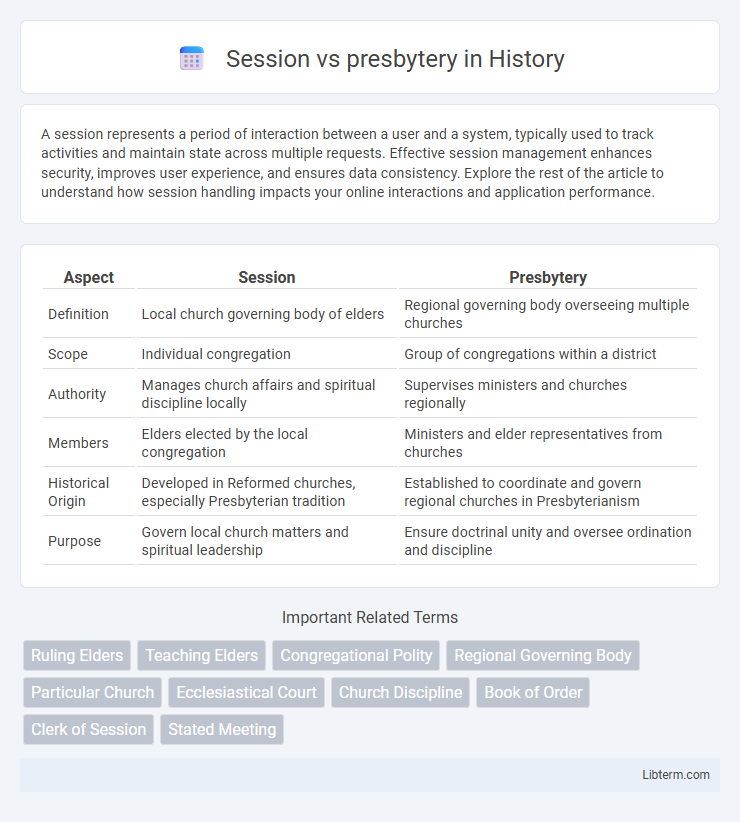A session represents a period of interaction between a user and a system, typically used to track activities and maintain state across multiple requests. Effective session management enhances security, improves user experience, and ensures data consistency. Explore the rest of the article to understand how session handling impacts your online interactions and application performance.
Table of Comparison
| Aspect | Session | Presbytery |
|---|---|---|
| Definition | Local church governing body of elders | Regional governing body overseeing multiple churches |
| Scope | Individual congregation | Group of congregations within a district |
| Authority | Manages church affairs and spiritual discipline locally | Supervises ministers and churches regionally |
| Members | Elders elected by the local congregation | Ministers and elder representatives from churches |
| Historical Origin | Developed in Reformed churches, especially Presbyterian tradition | Established to coordinate and govern regional churches in Presbyterianism |
| Purpose | Govern local church matters and spiritual leadership | Ensure doctrinal unity and oversee ordination and discipline |
Introduction to Church Governance
Session and presbytery represent two fundamental levels of church governance within Presbyterian polity, with the session governing individual congregations and the presbytery overseeing multiple churches in a regional district. The session typically consists of elected elders who manage spiritual and administrative affairs at the local level, while the presbytery includes ministers and elders delegated to address broader doctrinal, disciplinary, and mission-related matters. Understanding the distinction between session and presbytery is essential for grasping the layered decision-making structure that maintains both local autonomy and regional accountability in Presbyterian churches.
Defining Session in Church Structure
The Session in church structure refers to the governing body of a Presbyterian congregation, composed of elected elders who oversee spiritual and administrative matters. It functions as the local church council responsible for worship, discipline, and pastoral care within the congregation. The presbytery, by contrast, is a regional governing body that includes multiple sessions and provides oversight to several churches, ensuring doctrinal consistency and mutual support.
Understanding the Role of Presbytery
The presbytery functions as a regional governing body in Presbyterian churches, overseeing multiple local congregations and ensuring doctrinal consistency and accountability among sessions. It holds authority to ordain ministers, approve church plans, and resolve disputes, distinguishing its broader jurisdiction from the session, which governs individual congregations. Understanding the role of presbytery highlights its critical function in maintaining church unity and governance beyond the local church level.
Key Differences: Session vs Presbytery
The Session is the governing body of a local Presbyterian church, consisting of elected elders who oversee spiritual and administrative matters within the congregation. The Presbytery, a regional church council, comprises multiple Sessions and ministers, responsible for ordaining pastors, supporting local churches, and ensuring doctrinal unity across congregations. Key differences include the Session's focus on individual church governance versus the Presbytery's broader regional oversight and ecclesiastical authority.
Composition and Membership Comparison
A session typically consists of elected elders and the pastor, serving as the governing body of a single local congregation. In contrast, a presbytery comprises multiple ministers and representative elders from several congregations within a geographic region, overseeing broader church governance. The session's membership is limited to one congregation, while the presbytery's membership reflects collective representation across multiple churches.
Authority and Responsibilities
The Session is the governing body of a local Presbyterian congregation, consisting of elected elders who oversee spiritual guidance, worship, and church discipline within the church. The Presbytery is a regional governing body made up of multiple Sessions and ministers, responsible for ordaining clergy, overseeing church property, and facilitating cooperation among congregations. Authority in the Session is localized to one church, focusing on internal matters, while the Presbytery exercises broader authority over several churches, ensuring doctrinal consistency and clergy accountability.
Decision-Making Processes
The Session, comprised of elected elders, manages day-to-day local church decisions, focusing on spiritual guidance, worship practices, and member care. The Presbytery includes multiple Sessions and handles broader governance, including ordination, church discipline, and regional mission oversight. Decision-making in Sessions is more localized and immediate, while Presbyteries address larger-scale issues requiring collective representation from various congregations.
Relationship Between Session and Presbytery
The session, composed of elders governing an individual congregation, maintains direct oversight of local church affairs, while the presbytery consists of multiple sessions representing a broader regional authority. The relationship between session and presbytery is characterized by accountability and mutual support, as sessions report to the presbytery and adhere to its doctrinal and administrative standards. This structure ensures cohesive governance, doctrinal consistency, and collaborative mission work within the Presbyterian church system.
Impact on Congregational Life
The session, composed of elected elders, directly oversees the spiritual and administrative needs of a single congregation, fostering close pastoral care and community engagement. The presbytery, a regional governing body made up of multiple sessions, influences congregational life by providing broader oversight, resources, and conflict resolution across churches. This structure balances local autonomy with collective accountability, enhancing both individual church vitality and regional unity.
Conclusion: Navigating Ecclesiastical Leadership
The session functions as the governing body of a single Presbyterian congregation, responsible for spiritual oversight and local church governance, while the presbytery holds authority over multiple congregations within a district, providing broader oversight and support. Navigating ecclesiastical leadership requires understanding the distinct roles of these entities to effectively manage church affairs and ensure doctrinal consistency. Effective collaboration between sessions and presbyteries strengthens organizational unity and promotes shared mission objectives within Presbyterian polity.
Session Infographic

 libterm.com
libterm.com